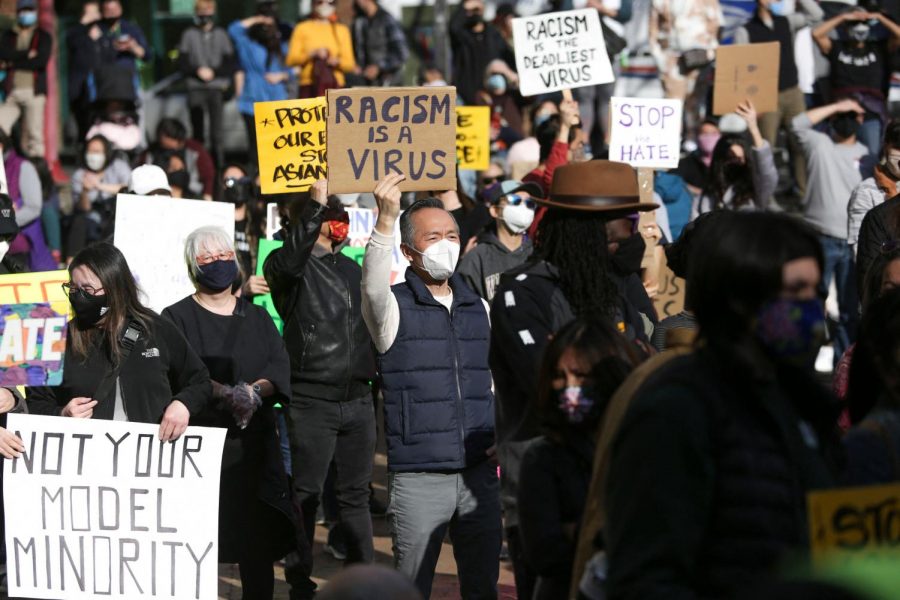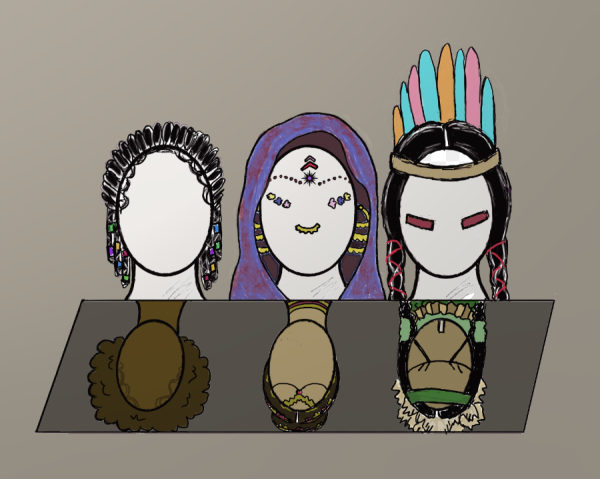Words have weight: casual racism at White Station
JASON REDMOND//AFP VIA GETTY IMAGES
People gather in a rally against anti-Asian hate in the Chinatown-International District of Seattle. Over the past year, it has been reported that anti-Asian hate crimes have increased by nearly 150%.
“You’re being too sensitive!” “You can’t take a joke!” “You’re acting like a snowflake!” These are just some of the common phrases that are often told to people who take offense to racist jokes and try to address them. With the recent rise of Asian American hate-crimes, the conversation about racism opens up again.
“Racism is more than just, ‘oh, I dislike you because of your race,’” Charisse Conard (11) said. “It goes further in depth. It can be hindering someone from things they want to do or know they can, solely because of the way they look.”
There is a misconception that racial equality and racial equity are interchangeable — when in reality, the two are completely different when it comes to fostering a community that is inclusive. Racial equity is not simply treating everyone equally, but meeting people based on where they are and treating them differently to ensure equitable results.
“Everybody deserves to start from the same foundation,” Garrett McNeill (10) said. “ Nobody should be lagging behind. Nobody should be given certain advantages based on anything. … It’s a basic human right that everybody starts with the same foundation.”
The issue of racism is more than skin deep. Those of different races feel there is difficulty in trying to express their thoughts on the controversial topic.
“Racism is something that is not acceptable anymore,” Spanish teacher Leslie Thornton said. “So, to give an opinion on it might lead some people to create a wrong perception. … And that will mean you will be misjudged through your opinion.”
While students often feel uncomfortable discussing matters of race, there are some who still use slurs without knowing the historical context behind them.
“Many of my students feel comfortable saying the N-word, and they use it as if it were such a normal term for them to use, as normal as saying, ‘good morning,’ ‘hello’ [or] ‘goodbye,’” Thornton said. “I can say it is equally used by an African American student [and] by [a] … Hispanic student.”
On the other hand, teachers have even infused racist undertones into their everyday casual remarks. Even though these statements may seem harmless, they exacerbate the problem and feed into toxic stereotypes.
“I have had teachers kind of expect less from me, as a black girl,” Conard said. “And [with] certain English teachers, I’ve heard the, ‘you speak so eloquently,’ and though they don’t say ‘for a black girl,’ I can feel that underlying message.”
Casual racism forces inherent expectations on students based only on skin color. While casual remarks may seem funny to students or teachers, these can be taken too far, leaving many stuck living in other’s preconceived notions.
“Humans don’t exist to live up to other people’s expectations,” Conard said. “People should just be allowed to be people and not be stuck in a box of, ‘oh you’re Asian, you have to be good at math. What do you mean you failed that test?’ … It harms more than it helps.”
Leaving a good first impression is important in the eyes of many, but when people have already created assumptions and opinions looking only at the surface level, it can create barriers that are difficult to break.
“When you approach a person, you don’t see them as an individual,” Yuktha Yalamanchili (12) said. “You see them by their race. Whatever stereotypes are related to that ‘look’ is what you will approach them by. When people come toward me, they approach me with this carefulness. They’re like, ‘This girl is Indian. She must be traditional. She must be homophobic.’ They have that perception of you and it takes a lot of effort to break that.”
Educating others on casual racism has always been a goal for some, but difficult given that it is a sensitive topic and rarely talked about. Students, teachers, and administration alike should be receptive when others have voiced their opinions on these matters. The key to ensuring respect for all races: when in doubt, ask the source.
“A lot of the time, people Google things — Quora is not going to give you the answer to whether or not you should call a kid a curryball.” Yalamanchili said. “Ask the source. Don’t try to get answers from other people, because that’s not going to give you an authentic answer.”
Your donation will support the student journalists of White Station High School. Your contribution will allow us to purchase equipment and cover our annual website hosting costs.








































